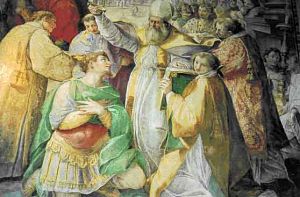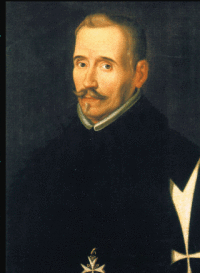The Influence of St Genesius:
Art and Artists
Art and Artists
Apart from the devotion of the people, as one would expect the life and martyrdom of St Genesius has inspired the work of a number of artists. The most important artistic representations of the saint are the frescos above his tomb in the Church of Santa Susanna in Rome. Painted by a young Italian artist Giovanni Battista Pozzo, he was commissioned by Princess Camilla Peretti, sister of the then late Pope Sixtus V, to decorate the entire Chapel of St Laurence in which the tombs of St Genesius and Pope St Elutherius are located; these frescos are among the few surviving examples of his work: Pozzo died shortly after completing the work.
Giovanni Battista Pozzo: The Conversion of St Genesius
St Genesius has also caught the attention of a number of writers and playwrights. The great Spanish writer Lope de Vega (1562-1635) wrote a play in 1608 about Genesius’ dramatic conversion. Giving Spanish drama a social tone, de Vega wanted to introduce religious themes into the public theatres which had, up until then, been quite secular. The play, entitled Lo fingido verdadero (“The Feigned Comes True”), is one of a number of religious dramas which he wrote based on the Bible or lives of the Saints. Lo fingido verdadero is seen as one of de Vega’s finest dramatic works.
Eugenio Caxés: Lope De Vega
Other playwrights have also honoured Genesius in his own profession including the French playwrights the Abbé Desfontaines (1685-1745) writing L’Illustre Comédien ou le Martyre de Saint Genest (“The Illustrious Comedian or the Martyrdom of Saint Genesius”) in 1645; Jean de Rotrou with his La veritable histoire de Saint Genest (“The True History of St Genesius”) also in 1645 and more recently Henri Ghéon’s play, The Comedian (1933).
Musicians too have found inspiration in Genesius’s story among them Karl Löwe (1796-1869) and Felix Weingartner (1863-1942) who composed his opera Genesius, op 14, in 1892. One contemporary composer, Philippe Auclair (b. 1952) has also turned his attention to the story with his oratorio Légende de Saint Genes (“The Legend of Saint Genesius”).
© The Fraternity of St Genesius 2007
Giovanni Battista Pozzo: The Conversion of St Genesius
St Genesius has also caught the attention of a number of writers and playwrights. The great Spanish writer Lope de Vega (1562-1635) wrote a play in 1608 about Genesius’ dramatic conversion. Giving Spanish drama a social tone, de Vega wanted to introduce religious themes into the public theatres which had, up until then, been quite secular. The play, entitled Lo fingido verdadero (“The Feigned Comes True”), is one of a number of religious dramas which he wrote based on the Bible or lives of the Saints. Lo fingido verdadero is seen as one of de Vega’s finest dramatic works.
Eugenio Caxés: Lope De Vega
Other playwrights have also honoured Genesius in his own profession including the French playwrights the Abbé Desfontaines (1685-1745) writing L’Illustre Comédien ou le Martyre de Saint Genest (“The Illustrious Comedian or the Martyrdom of Saint Genesius”) in 1645; Jean de Rotrou with his La veritable histoire de Saint Genest (“The True History of St Genesius”) also in 1645 and more recently Henri Ghéon’s play, The Comedian (1933).
Musicians too have found inspiration in Genesius’s story among them Karl Löwe (1796-1869) and Felix Weingartner (1863-1942) who composed his opera Genesius, op 14, in 1892. One contemporary composer, Philippe Auclair (b. 1952) has also turned his attention to the story with his oratorio Légende de Saint Genes (“The Legend of Saint Genesius”).
© The Fraternity of St Genesius 2007



Praying for those involved in cinema and theatre
